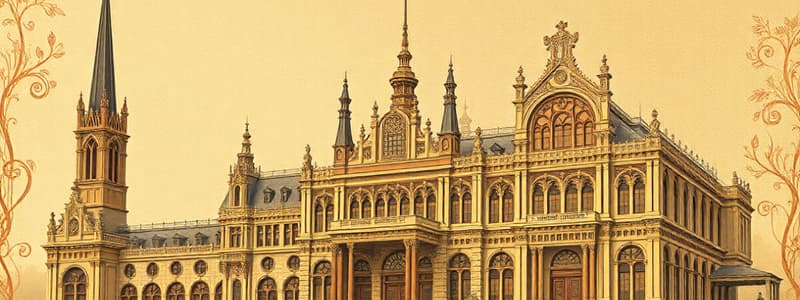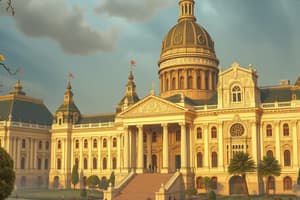Podcast
Questions and Answers
Which system of government has a separate head of state and a head of government?
Which system of government has a separate head of state and a head of government?
- Chancellor-type Systems
- Presidential Systems
- Directorial Systems
- Parliamentary Systems (correct)
What distinguishes a presidential system from other systems?
What distinguishes a presidential system from other systems?
- There is no separate head of state and head of government. (correct)
- The president is accountable to the legislature.
- The president can dissolve the legislature.
- Members of the government are elected by the parliament.
In which system of government does the prime minister have the ability to dissolve the legislature?
In which system of government does the prime minister have the ability to dissolve the legislature?
- Directorial Systems
- Chancellor-type Systems
- Semi-presidential Systems (correct)
- Presidential Systems
What is a key feature of the chancellor-type system?
What is a key feature of the chancellor-type system?
Which of the following best describes a directorial system?
Which of the following best describes a directorial system?
In a parliamentary system, who is accountable to the parliament?
In a parliamentary system, who is accountable to the parliament?
Which statement is true about the autonomy of governments?
Which statement is true about the autonomy of governments?
What is a potential political capacity issue in government?
What is a potential political capacity issue in government?
What characteristic defines the accountability of the Prime Minister in a parliamentary system?
What characteristic defines the accountability of the Prime Minister in a parliamentary system?
Which feature is unique to a presidential system of government?
Which feature is unique to a presidential system of government?
In which system does the head of government have strengthened powers but cannot dissolve the parliament?
In which system does the head of government have strengthened powers but cannot dissolve the parliament?
What role does the president have in a semi-presidential system?
What role does the president have in a semi-presidential system?
How are members of the government chosen in a directorial system?
How are members of the government chosen in a directorial system?
Which of the following describes a key characteristic of a semi-presidential system?
Which of the following describes a key characteristic of a semi-presidential system?
What is a defining feature of a chancellor-type system regarding accountability?
What is a defining feature of a chancellor-type system regarding accountability?
What does the term 'constructive vote of no-confidence' refer to in a chancellor-type system?
What does the term 'constructive vote of no-confidence' refer to in a chancellor-type system?
Which feature of a parliamentary system differentiates it from a presidential system?
Which feature of a parliamentary system differentiates it from a presidential system?
What characterizes a semi-presidential system of government?
What characterizes a semi-presidential system of government?
In which system does the head of government have the ability to establish political direction, but cannot dissolve the parliament?
In which system does the head of government have the ability to establish political direction, but cannot dissolve the parliament?
Which statement regarding the accountability of the president in a presidential system is accurate?
Which statement regarding the accountability of the president in a presidential system is accurate?
Which type of government typically results from a coalition of parties?
Which type of government typically results from a coalition of parties?
In a directorial system, how is the role of the president characterized?
In a directorial system, how is the role of the president characterized?
What is a common limitation of party control over government officials?
What is a common limitation of party control over government officials?
What distinguishes a chancellor-type system from a traditional parliamentary system?
What distinguishes a chancellor-type system from a traditional parliamentary system?
Which of the following is NOT a characteristic of a legitimate state?
Which of the following is NOT a characteristic of a legitimate state?
Which method of state creation involves the establishment of strong institutions to challenge monarchical power?
Which method of state creation involves the establishment of strong institutions to challenge monarchical power?
What concept describes the bond that ties individuals to a nation, particularly emphasized during the Age of Enlightenment?
What concept describes the bond that ties individuals to a nation, particularly emphasized during the Age of Enlightenment?
In the context of modern challenges, which question is relevant regarding the survival of nation-states?
In the context of modern challenges, which question is relevant regarding the survival of nation-states?
Which factor is crucial for the extensions of governance within a state?
Which factor is crucial for the extensions of governance within a state?
What is a defining characteristic of an effective state in the context of nation-building?
What is a defining characteristic of an effective state in the context of nation-building?
Which method of state creation relies on the establishment of strong institutions capable of challenging monarchal power?
Which method of state creation relies on the establishment of strong institutions capable of challenging monarchal power?
What does the term 'nation' refer to in the context of citizenship and nationhood?
What does the term 'nation' refer to in the context of citizenship and nationhood?
Which challenge regarding nation-states has become more prominent in the 21st century?
Which challenge regarding nation-states has become more prominent in the 21st century?
What is a critical aspect of the evolution of the state as described in the content?
What is a critical aspect of the evolution of the state as described in the content?
Flashcards
Presidential System
Presidential System
A system where the executive branch, led by a president, is separate from the legislature; the president is directly elected and not accountable to the legislature.
Parliamentary System
Parliamentary System
A system where the executive branch, headed by a prime minister, is accountable to the legislature; often includes a separate head of state and prime minister.
Semi-Presidential System
Semi-Presidential System
A system combining elements of presidential and parliamentary systems; a directly elected president and a prime minister who is responsible to the parliament.
Chancellor-type System
Chancellor-type System
Signup and view all the flashcards
Directorial System
Directorial System
Signup and view all the flashcards
United vs Divided Government
United vs Divided Government
Signup and view all the flashcards
Majority Government
Majority Government
Signup and view all the flashcards
Source of Executive Power
Source of Executive Power
Signup and view all the flashcards
Head of State vs. Head of Government
Head of State vs. Head of Government
Signup and view all the flashcards
Monarchy
Monarchy
Signup and view all the flashcards
Republic
Republic
Signup and view all the flashcards
Head of State
Head of State
Signup and view all the flashcards
Head of Government
Head of Government
Signup and view all the flashcards
United Government
United Government
Signup and view all the flashcards
Divided Government
Divided Government
Signup and view all the flashcards
State
State
Signup and view all the flashcards
Nation-Building
Nation-Building
Signup and view all the flashcards
What are the hallmarks of a modern state?
What are the hallmarks of a modern state?
Signup and view all the flashcards
Types of State Formation
Types of State Formation
Signup and view all the flashcards
Evolution of the State
Evolution of the State
Signup and view all the flashcards
What are the key elements of a modern state?
What are the key elements of a modern state?
Signup and view all the flashcards
How do states evolve?
How do states evolve?
Signup and view all the flashcards
Fallen State
Fallen State
Signup and view all the flashcards
Study Notes
Forms of Government
- Types of government include monarchy and republic.
- Distinction lies in the source of the head of state's power.
Systems of Government
- Classification considers the relationship between the executive and legislature.
- Types include presidential, semi-presidential, parliamentary, chancellor-type, and directorial.
Presidential Systems
- USA (1787) is an example.
- President is elected directly for a fixed term.
- There's no separate head of state and government.
- President is not accountable to the legislature, though appoints government members (administration).
- President can issue decrees, has a strong veto, and cannot dissolve the legislature.
Parliamentary Systems
- United Kingdom is an example.
- Separate head of state (symbolic) and head of government (Prime Minister).
- Parliament is supreme.
- The Prime Minister (PM) and government members are accountable to parliament.
- PM can dissolve the legislature.
Chancellor-type Systems
- Federal Republic of Germany (FRG) (1949) is an example
- A quasi-parliamentary system is used.
- Head of government has been strengthened.
- Employ constructive vote of no confidence, which defines the political line.
- Ministers are accountable to parliament but cannot be dissolved by the head of government.
Semi-presidential Systems
- An example is France (1958).
- Separate president and prime minister.
- President is elected directly, appoints government members, may chair legislative sessions, and issue decrees.
- President can dissolve the parliament.
- Government is accountable to the parliament as well.
Directorial Systems
- Switzerland (1848) is an example.
- Government members are elected by the parliament.
- No separate prime minister (PM) or president.
- A collegiate system exists where there is no single head of government..
- Government is independent from the legislature.
Autonomy of Governments
- Factors influence government autonomy:
- Party programmes
- Member selection processes
- Party influence
- Party control over the government
- Presidentialisation and personalisation, including role of individuals.
Political Capacity
- Includes considerations of:
- United versus divided government
- Majority versus minority governments
- One-party versus coalition governments.
Studying That Suits You
Use AI to generate personalized quizzes and flashcards to suit your learning preferences.



